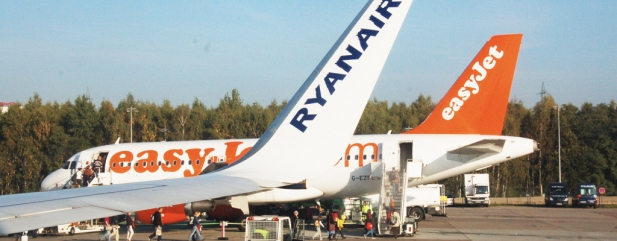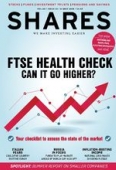Archived article
Please note that tax, investment, pension and ISA rules can change and the information and any views contained in this article may now be inaccurate.
EasyJet vs Ryanair: Which shares could have made you richer?

Low-cost airline EasyJet (EZJ) has surprised the market by delivering a pre-tax profit of £8m over the traditionally loss-making winter period and revealed an interesting new growth strategy.
The airline sector is embroiled in a price war that contributed to the demise of rivals Monarch and Air Berlin last year, while rising oil prices have increased fuel costs.
EasyJet’s upbeat half year results in May paint a stark picture compared to fierce rival Ryanair (RYA), which warned investors a series of headwinds and higher costs will impact earnings.
The conflicting outlook between EasyJet and Ryanair begs the question – which would an investor have made more money from and is EasyJet’s strong trading expected to continue?
Since EasyJet floated on the stock market in November 2000, it has rewarded investors generously with a 716% total return.
Over the same period, Ryanair has delivered a more modest but still impressive 599% total return.
In the six months to 31 March, EasyJet revealed a record number of passengers at 37 million and strong ancillary sales helped drive revenue 19.5% higher to £2.18bn.
The airline has also been able to more efficiently fill its flights as its load factor rose from 90.2% to 91.1% over the same period.
TARGETING THE THRIFTY AND LOYAL
Under a new strategy, EasyJet will increase its investment in EasyJet Holidays to tap a greater share of the market and plans to introduce a loyalty programme to encourage customers to fly again.
EasyJet Holidays aims to make it easier for its customers to book a package holiday without breaking the bank and will be led by the newly appointed Garry Wilson.
Customer loyalty is important for EasyJet as 46% of customers only fly with the airline once a year – and returning customers tend to book twice as many flights.
By bringing in a new loyalty scheme, EasyJet hopes to drive passenger and ancillary sales by using more data and investing in technology to improve its offering and cut costs.
AJ Bell investment director Russ Mould is intrigued by the new strategy but warns the holiday market it is a competitive space to break into.
Despite this reservation, Mould believes EasyJet will be able to take advantage of its well-known brand.
‘Getting them to add accommodation in the same transaction could be an easy win for the group as long as the price is right,’ comments Mould.
Ryanair is focusing on growing its aircraft to nearly 600 in an attempt to hit 200m passengers per year by 2024.
UPBEAT GUIDANCE
In the year to 30 September 2018, EasyJet forecasts a headline pre-tax profit of between £530m to £580m excluding the impact of a headline loss from integrating its new base at German Airport Tegel, this was ahead of previous consensus expectations of £505m.
Looking ahead, pre-tax profit is anticipated to increase to £645.8m in 2019 and £660.5m in 2020.
Last year the picture was rather less positive as the company was forced to cut its proposed dividend by 24% to 40.9p amid lower ticket prices, currency headwinds and higher costs hit profits.
The airline has a dividend payout ratio of 50% of headline profit after tax and expects to deliver dividend growth in 2018.
WHY IS RYANAIR STRUGGLING?
Like EasyJet, Ryanair struggled last year. It was hit by strike threats, widespread disruption and flight cancellations following pilot rostering issues.
In order to appease unhappy pilots, the budget airline decided to boost pay and is planning to invest an additional €200m for higher pay and to attract new talent.
Further costs of more than €400m are expected as oil prices continue to rise, resulting in Ryanair issuing a profit range guidance of €1.25bn to €1.45bn in the year to 31 March 2019. At the lower end this falls short of analyst consensus of €1.37bn.
Pre-tax profit is forecast to hit €1.55bn in 2020 and jump further to €1.71bn, according to Reuters data.
WHAT DO THE ANALYSTS THINK?
Broker Cantor Fitzgerald analyst Robin Byde expects estimates for EasyJet to rise ‘by at least £50m’ on the back of the strong half year results.
Byde says the issue for investors is how much of the good news is priced in the stock as the shares have rallied 14.4% to £17.18 (24 May) since the start of 2018.
Despite Ryanair’s lower guidance, Canaccord Genuity’s Gert Zonneveld is confident it has much to offer going forward with its sustainable unit costs advantage, superior margins and long-term growth prospects.
While fares are expected to be broadly flat this year for Ryanair amid high European capacity growth, broker Numis says industry consolidation could provide a catalyst. (LMJ)
Important information:
These articles are provided by Shares magazine which is published by AJ Bell Media, a part of AJ Bell. Shares is not written by AJ Bell.
Shares is provided for your general information and use and is not a personal recommendation to invest. It is not intended to be relied upon by you in making or not making any investment decisions. The investments referred to in these articles will not be suitable for all investors. If in doubt please seek appropriate independent financial advice.
Investors acting on the information in these articles do so at their own risk and AJ Bell Media and its staff do not accept liability for losses suffered by investors as a result of their investment decisions.

 magazine
magazine









